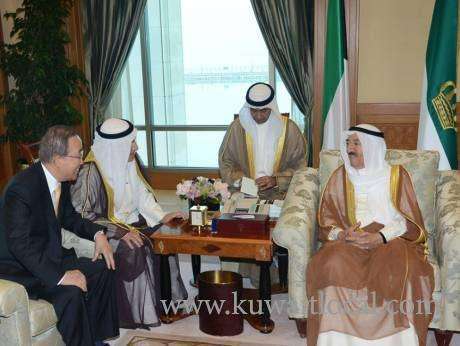Latest News
- Pay Electricity Bills Before Government Transactions Under A New...
- MoCI Cracks Down On Commercial And Retail Fraud
- Four People Were Injured In A House Fire In Raqqa
- Egyptian Deported
- Juwaihil Sentenced To 3 Years For Insulting The Tribe
- Kuwait Issues 1,895 Private Company Licenses
- Passengers Drop At Kuwait Airport
- Six Vehicles Collided Near ‘360 Mall’ On Sixth Ring Road
- Uzbekistan President Meets Kuwaiti Foreign Minister During GCC-C...
- Ministry Of Social Affairs Considers Investment Within Headquart...
- Kuwaiti Lawyers Association Launches 'Paperless Justice' Initiat...
- Parliamentary Committees Coordination: MPs Express Preferences F...
Kuwait Mosque Hit By Daesh Bomb Reopens

The wood panelling bearing Quranic verses gleams inside Imam Sadiq Mosque and the carpeting is soft underfoot for worshippers who come to pray in what is one of Kuwait’s oldest Shiite mosques — and the site of the country’s worst militant attack in modern history.
It’s been a year since a Daesh suicide attacker, his explosive-filled vest hidden under traditional white robes, blew himself up there. He killed at least 27 people and wounded 227 in a day of violence during Ramadan, a day that also saw shootings on a Tunisian beach resort and an attack on a US-owned factory in France. Daesh later claimed responsibility for the Kuwait bombing, along with the attack in Tunisia.
Since that day of carnage, Kuwait has rebuilt the mosque and flooded billboards and social media with calls for unity in this small nation of 3 million people. “Kuwait is certainly not immune to the sectarian tension in the area,” Kuwait University political science professor Shafeeq Ghabra said. “Sectarianism is one symptom of so many issues.”
The Imam Sadiq Mosque, named after a historically revered Shiite figure, is tucked into the capital’s Al Sawaber neighbourhood on a street of boutique restaurants popular with the country’s chic socialites. It survived Iraq’s 1990 invasion of Kuwait and the expulsion of Saddam Hussain’s troops by US-led forces the following year.
All that changed with the June 26, 2015, suicide bombing that struck as worshippers stood shoulder-to-shoulder in group prayer. The powerful explosion tore into the mosque’s ceiling, spread blood across its floors and sent debris flying. Minutes after the attack, Kuwait’s elderly ruler Shaikh Sabah Al Ahmad Al Sabah stood at the site, surrounded by the crowds and ignoring the advice of his security forces to leave. “Those are my sons,” he said, speaking of the victims, local media reported at the time.
Shaikh Sabah’s comments and presence carried much power in Kuwait, a predominantly Sunni Arab nation where at least at third of the population is believed to be Shiite — mostly descendants of Persian merchants, seafarers and craftsmen who moved to the country before its establishment. Shiites now also hold key positions in Kuwait’s government and freely elected parliament.
Kholoud Al Feeli, who lost her uncle in the attack, said the Emir’s reaction showed that he views everyone as an equal. “Kuwaitis have always been open toward other beliefs and differences,” she said. “We are a melting-pot nation, with many people of Levantine, Persian, Egyptian and even Indian ties, if not by blood then by marriage.” Shaikh Sabah paid for nearly all the renovations needed at the mosque, which reopened this month after a remembrance ceremony for those lost.
“The one-year remembrance service held at the mosque is a great example of how Kuwait’s unity and solidarity is unquestionable in times of crises,” said Abdulnabi Al Attar, a supervisor at the mosque and member of its board. “Many leading Sunni figures attended the service, headed by the emir of Kuwait himself,” he added. “We as a nation have proved our resilience before, in the 1980s with Saddam’s war against Iran, in the Gulf War, and as close as last year’s ISIS [Daesh] attack,” she said. “I hope that we can come out of this more united.”
SOURCE : GULFNEWS
Trending News
-
 Eid Al Fitr 2024: Crescent Moon Not Sighted In Sau...
08 April 2024
Eid Al Fitr 2024: Crescent Moon Not Sighted In Sau...
08 April 2024 -
 Kuwaiti Cabinet Plans Public Holiday On April 4, 2...
01 April 2024
Kuwaiti Cabinet Plans Public Holiday On April 4, 2...
01 April 2024 -
 Kuwait Implements Home Biometrics Services Ahead O...
14 April 2024
Kuwait Implements Home Biometrics Services Ahead O...
14 April 2024 -
 MOI Urges Pre-booking For Biometric Appointments V...
02 April 2024
MOI Urges Pre-booking For Biometric Appointments V...
02 April 2024 -
 When Will Eid Al Fitr 2024 Take Place In Qatar, Ba...
08 April 2024
When Will Eid Al Fitr 2024 Take Place In Qatar, Ba...
08 April 2024 -
 On Sunday, The Meteorological Department Warns Of...
07 April 2024
On Sunday, The Meteorological Department Warns Of...
07 April 2024 -
 Kuwait Airways Provides Update On Flight Schedule...
14 April 2024
Kuwait Airways Provides Update On Flight Schedule...
14 April 2024 -
 Winners Of Kuwait National Assembly 2024 Elections
06 April 2024
Winners Of Kuwait National Assembly 2024 Elections
06 April 2024 -
 Gathering For Eid Al-Fitr Prayers: Kuwaiti Citizen...
10 April 2024
Gathering For Eid Al-Fitr Prayers: Kuwaiti Citizen...
10 April 2024 -
 Transforming Kuwait's Public Transport: The Digita...
07 April 2024
Transforming Kuwait's Public Transport: The Digita...
07 April 2024












Comments Post Comment